|
| Catherine Hayes, last postmaster of Hayden Store |
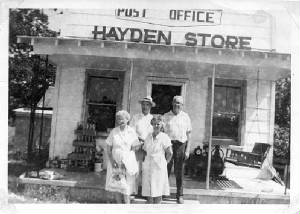
|
| Front Right |
| Painted by Dan Hayes |
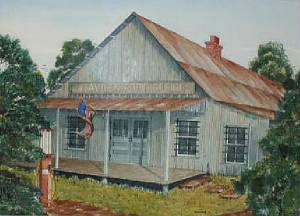
|
| displayed in the Maries County Courthouse |
The Hayden Post Office was established by the Post Office Department on March 5, 1890. Application was made by Martin Copeland
on Feb. 15, 1890 and was signed by him and by (John) F. Rowan (Rowden), Postmaster at Vienna at the time. The location was
shown as on the (S 1/2 of) NW 1/4 of Sec. 25, Township 39N, Range 10 W in Maries County, State of Missouri. The application
shows the location as being five miles east of the post office of Weldon, thirteen miles west of Vichy, and nine miles from
Vienna in a S. West direction. It shows that the nearest river was the Gasconade; three and one quarter miles south and the
nearest creek is Dry Creek, 1/4 mile north.
On the top of the application where the name of the Post Office is shown, the name Hayden is written in and is definitely
of a different hand writing. Thus, it is presumed that the application was submitted with the name blank and the Post Office
Department has filled in the name. It is not known from where the name Hayden came.
Martin Copeland died on April 8, 1915. The last paper in the location file of the National Archives signed by Martin
Copeland was dated Nov. 2, 1907, and the next paper is dated Feb. 4, 1935 by J. Ray Thompson. However, the activity shown
on the "Record of Appointments" shows the following:
Postmaster----------Date Appointed
Martin Copeland---------March 5, 1890
John W. Copeland--------June 21, 1915, declined
Wm. M. Copeland---------Aug. 9, 1915
Thos. C. Evans----------June 14, 1917
J. Ray Thompson---------May 16, 1923
Minnie Catherine Hayes--July 1, 1949 (assumed charge)
Mrs. Hayes had been acting postmaster for the 12 months
previous to her appointment. When Mrs. Hayes retired on
June 30, 1972, the post office was closed.
The above article was taken from ;A History of the Post Offices and Postmasters of Maries County, MO,; compiled by
Hoyle Mayfield and published by The Historical Society of Maries County.
Thanks to Russell Hayes and Ralph Burgess for the picture of the Hayden Store & Post Office.
Note:
Martin Copeland was Harold Copeland's grandfather.
John W. Copeland was Harold Copeland's father.
Wm. M. Copeland was Gayle Copeland's father.
Leona (Regan) Copeland Hankey was Harold Copelan's mother.
Thanks to the late Charley Beltz for the research on this article
Historical Society of Maries County
| Ralph Burgess in front of Old Hayden Store, 1988 |
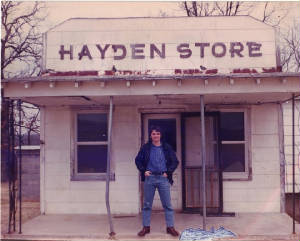
|
| Photo taken by James Herndon with Ralph's camera |
| Dec. 1994, Sheriff Willard Shockley |
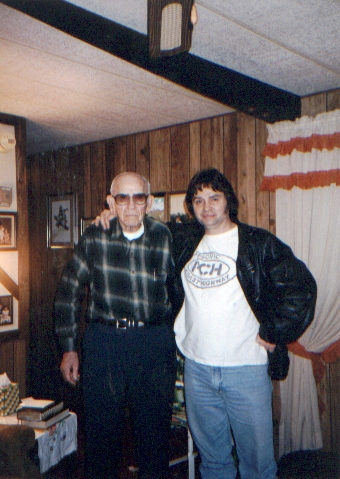
|
| and Ralph Burgss meet up 30 years later |
In December of 1994 I had just been re-united with my sister Faith Burgess and we travelled to Vienna to visit with Maries
County Gazette Editor, Carol Miller. While there we looked through some old newspaper clippings and Carol drove us out to
Sheriff Willard Shockley's home.
As we entered I immediately recognised him even though he was a bit stooped Mr. Schockley was still agile and his memory
recollected when he was called to Hayden Store by Catherine Hayes to pick me up. His actual testimony from the transcript
was:-
Sheriff Shockley testified
that he was called to Hayden Store on July 4th and there picked up Ralph Burgess; that at the time he observed bruised
places on the back of his legs and a cut on his forehead; that the boy told him he was afraid to go back home.
The sheriff turned the boy over to Mr. Hutchison, Juvenile Court officer who called In Mrs. Elley, Welfare Director of
Maries County;
that Mr. Burgess was like-wise called and he brought in the rest of the children. The sheriff testified he was present
when the other children came in and observed that Faith had a cut over her left eye and it was all black.
IN RE BURGESS Mo. Cite as 359 S.W.2d 489
I remember clearly that Sheriff Shockley was a decent man and did not hesitate in taking me to the County Juvenile Officers
home. I was thankful too that Sheriff Shockley had an extra deputy after he had called Frank Burgess up to bring the rest
of the children to the Vienna Courthouse. Both the Sheriff and his deputy were carrying sidearms and they stood on either
side of me when Frank and Helen Burgess entered along with my brothers and sisters.
Frank took a seat directly across from me and I recall clearly him stating:- "Boy, I'll kill you for breaking
up this family"! Well, Frank is dead now, and unfortunately for him he also ended up going to jail for smuggling in
class one narcotics into the State Pentitentiary in Jefferson City, Missouri. Life sure is weird!
| Catherine Hayes |
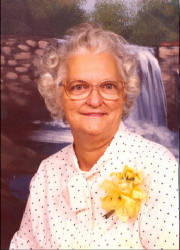
|
| A very courageous and kind woman |
Even today, over 40 years later, I recall the day I walked into Hayden Store with Arnold Bassett as if it were yesterday.
Some memories are like that; they just cling to your soul, because probably they are so precious!
Anyway, if you don't believe in divine intervention, I sure do! How could a little boy of nine, run away from a home
that was way out in the boon-docks surrounded by Woods in every direction and make it to a town over thirty miles away (Waynesville)?
Somehow that 4th of July day everything seemed to go my way! I was working in the garden towards the back of the house which
was just secluded enough for me not to be in direct sight of the house itself.
I decided to head straight for the woods in the opposite direction of the Bassett farm and away from my left which
was towards Joe Blackwell's house. That much I knew. (I've always had a good sense of direction)....
I tromped right into the woods through the trees and once inside ran and ran. It seemed like hours when I heard cars
passing on a road straight ahead of me. Sure enough shortly thereafter I saw the black topped highway and cars travelling
in both directions. I decided to chance waving a car down and hitching a ride.
A car stopped soon enough and it was two soldiers on their way to Ft. Leonard Wood and they told me to get in the
back seat, that they would take me as far as the next big town. I felt relieved. I knew now that I was quite a distance
away from our house and had a chance to get away. Where to, I didn't know yet, but I just knew I had to get as far away as
possible from Helen Burgess.
The soldiers dropped me off in the town center and I was getting real hungry. Fortunately in those days a person could
drink out of the streams in the wild and not worry about it, which I had done while running through the woods.
It wasn't long after that I saw a car I vaguely remember it being red and it was a fancy car and I recognised it as
being our neighbor Arnold Bassett's car. I believe he saw me because he was driving right down the main street of the town
when suddenly he stopped and got out and began chasing me. Arnold caught up with me in an alleyway and held me and tried
to calm me down, by saying he was going to take me to a restaurant and buy me a hamburger. While eating I showed him my lumps,
welts and bumps and made it clear to him that if he took me back to Helen Burgess's house she would probably kill me!
All Arnold kept on saying was how much my brothers and sisters were missing me and he had to get me back cause it
was getting late. Arnold walked with me to the car and off we drove right back up the highway I had just hitch-hiked down.
As we turned off the main black-topped highway the same road the school bus took I knew that we were getting close to our
house on Maries County Road.
Just as we were coming round a bend I could see the sign of HAYDEN STORE, and that's when Arnold asked me if I wanted
an ice cream. I said oh yes!
Arnold walked with me inside and that's when Catherine Hayes came up and asked me "why did you run away Ralph?"
I was wearing shorts and a tattered t-shirt cause it was July after all, but the black and blue spots, and welts and a cut
on my forehead and bumps on my head were enough to convince Catherine Hayes she had seen enough!
I recall clearly how Catherine Hayes said to Arnold. "I can't let you take that boy back t that house". "I'm
going to have to call the Sheriff out here". I felt that Mrs. Hayes knew that I was being mistreated because her daughter
Patsy went to the same school as me, called Hayden Heights right off the main higway at the end of the road. I thought that
Patsy probably mentioned to her mom and dad that us Burgess children always came to school with lumps, bumps and black eyes
and sometimes even wearing bandages.
When I think back on all of this now, I realise how much courage that took for a woman to stand up to my neighbor Arnold
Bassett and not allow him to take me out of that store! In fact I don't believe a man would have been so sensitive and probably
would have allowed Arnold Bassett to take me straight on back home.
I also think back now, why did Arnold Bassett who was at least 19 20 years old at that time not turn me over to the
police in Waynesville after he saw the bruises on me? Or why did he not take me straight on in to the Sheriff's office in
Vienna when he was driving me back?
That's why it's not a light matter with me. The fact is it took a "very brave person" in the form of Catherine
Hayes to call the Sheriff no matter how you look at it. Had Catherine Hayes allowed Arnold Bassett to take me back inside
his car back to the Burgess's I don't believe I'd be around today to be writing this!
The reason I say this is because when I was reading the trial transcripts it came out that Frank and Helen Burgess had
already packed up the furniture and were getting ready to move out of the state of Missouri to Kansas. Why when I ran away
didn't Frank and Helen Burgess or the Bassett family call the local Sheriff to look for me instead of allowing Arnold Bassett
to drive over thirty miles out of that area to hunt for me? Was it because they knew that if the law became involved they
might get into trouble?
All of these thoughts most certainly also went through Catherine Hayes' mind, yet Mrs. Hayes had the strength of character
to protect my life by calling in the Sheriff!
Catherine Hayes
Catherine was born in Hannibal, Mo, to Mattie and Reeder Clement, November 14, 1912. When she was about three years old
they moved to St Louis. Mattie Clement was a seamstress, (A craftsman), who taught Catherine to sew at a young age. Catherine
and her mom had quite a following of people requiring their services for bridal gowns, baby dresses, and the like. She started
high school but started working in a grocery store. Because of the depression, times were hard. Catherine quit high school
after her freshman year to work full time.
Living across the street from Reeder and Mattie was a couple from the Dry Creek area, John and Ruth Jones. Ruth had a
brother, Charley, who was staying with them while working in the St Louis area during the summer. Charley was attending college
to become a teacher. Shortly after Charley met Catherine, they became an item. Catherine thought that, “Teaching
school is an honored profession and that Charley would be a “Good catch”. (It didn't hurt that he was
also quite a handsome dude). Charley and Catherine were married in 1933, by a Justice of the Peace. They went back to Ruth
and John's house after the wedding. John had left his lunch box home that day and Charley and Catherine's bridal lunch consisted
of one of John's bologna sandwiches.
Charley and Catherine moved to the Vienna area when, upon receiving his teaching certificate, Charley started his first
teaching job. His first teaching assignment was at Bloomgarden, a one room school about one mile from the Gasconade River,
just off highway 63. Shortly thereafter they started their family. Charley had been teaching at Bloomgarden for four years
when they moved to a farm, (As Catherine called it, ;The holler) so that Charley could pursue, not only his love of teaching
but his second love, farming.
In 1949, Charley, Catherine and family moved to Hayden, Mo when they bought a farm from J. Ray Thompson, the Postmaster
at Hayden. The property included the farm, a store, gas pump, and the U.S. Post Office at Hayden. Catherine was appointed
Post- mistress on July 1, 1949 and rapidly developed a talent for merchandising. Catherine and Charley took their old pick-up
truck to St Louis and bought a load of remnants of material, patterns, thread and odds and ends and started the Hayden Fabric
Shop. Utilizing her skills, learned early in her life, she knew exactly what material to buy and how to buy at the right
prices. The shop became very busy and Catherine decided to expand into other towns. She had shops in St James, Eldon, and
Wentzville when Charley had a heart attack. They decided to back out of the fabric businesses as soon as was possible.
She wrote the "Hayden Items" for the Maries County Gazette and the Dixon Pilot for several years. She was the
community "Beacon" for news, social events, emergencies, etc. and contributed often to The Reader's Digest about
local happenings of generic interest.
Utilizing her merchandising skills, Catherine had dramatically increased the sales volume of stamps purchased at the Post
Office through the years. Had she not increased the sales so greatly, the Post Office would have been closed in the 60's.
In June of 1972 Catherine retired as Postmistress. At that time the U.S. Postal Service permanently closed the post office.
Catherine loved her Country. She loved to travel the country and to meet new people. She would talk to anyone that would
stand still. After the death of Charley in 1973 Catherine remained on the family farm. She enjoyed traveling with her, (As
she called them), running buddies Beda Nelson and Olave Minze. They traveled to St Louis, Springfield, Jefferson City, Branson,
and even visited a son in Huntsville, Alabama, and a son in New York. Her son in New York worked for a company that had a
private jet plane. On a trip to the west coast the plane stopped in Springfield and took Catherine and her son’s
mother-in-law to New York. Catherine's comment after going from Springfield to New York in two hours; Sure wish Charley could
see me now!. When her granddaughter was attending University of Missouri/Rolla, she invited Catherine to a sorority party
at the University. Catherine was just delighted.
In 1977 Catherine was diagnosed with Leukemia and was given a relatively short time to live. At the end of a visit by
her son she informed him,; This isn't going to get me yet. I have too many things to do and some grandkids that I want to
see grow up! While visiting one of her sons in New Jersey she started internal bleeding and was admitted to the emergency
room at the hospital. The doctor told her son that she probably wouldn't make it through the night. Her son, knowing her
spirit, said,;This is one tough lady! Nineteen days later she got on an airplane and went to Florida to visit another son.
Catherine and Charley had three sons and two daughters, six granddaughters, four grandsons, nine great-granddaughters
and six great-grandsons. Quite an accomplishment for a couple that had to share a bologna sandwich for their wedding dinner.
Catherine passed away at the Rolla Hospital on June 29, 1987. While going through her many treasurers we found the
following article tucked away neatly in a shoe box. We think it was written in 1982.
Eldest Son: Robert O. Hayes
THIS LAND OF OURS
Do we really appreciate this land of ours or just take it for granted and expect the United States owes us a living?
How many of us have even looked around us and noticed the beauty of our surroundings? How many of us really know and
have seen our own Missouri? We think of going on vacation or on a trip to the East or California or Colorado or some state
that has beauty-true, but don't you think we have beautiful spots in our own Missouri?
I was raised on a prairie, not a tree to climb or to put a play house under, not a creek to swim in or to wade in or catch
the Bull Head, and the Sunfish. Trees to me are sacred. I look over our 200 acres and marvel and think, they belong to me!
I can't stand to see even the scrubbiest oak cut down near the house and my husband says they are a detriment to our water
system.
Now that my childhood days are over and I listen to my daily customers who visit my post office and country store, I begin
to list the cultural advantages of our youth. We had a home where there was plenty of books and magazines and instructive
conservation; about parents who believed in what was right and decent, and in giving their children a good education; about
a little community where people put their roots down deep into the soil of an America they loved. A place where it wasn't
considered nosy to be interested in your neighbor and concerned about them in their time of trouble.
Today I live in such a community and am very thankful. Being a postmaster, one also has to serve as a public relations
agent for the neighborhood, ready to help in any emergency. I have been called to an attempted suicide, stroke of a brother-in-law,
death, car wrecks and many unpleasant duties. I am also called upon to be the Civil Defense Coordinator of our locality,
P.T.A. petitions signed for different complaints and a number of things for which I am thankful I am well and able to do.
To ward off childhood delinquency in our neighborhood, we have long dusty roads to ride bikes, creeks and a river to catch
the fish, a bluff to swim under at Clifty Creek, a famous advertised Natural Arch, formed by nature which is visited by many
tourists. Rabbits, squirrels, quail, and deer to hunt when in seasons, the yapping of a coyote, fox and coon hunts in the
night, the pageantry of the harvest, where youths can make extra pen money during the hay and combining seasons. We have the
charcoal kilns which many neighbors go sweating by with their log trucks, also trucks of golden grain, sweet smelling bales
of hay, the fodder going to silage silo's.
On cold winter days, men would come and sit by my fire, and sometimes the women would come along, and all would spin yarns.
It isn't the civil war days but WW II they often discuss. Doubtless, there was an element of fiction in the tales they tell
but there is also pride. For some of the older group, who were the leathery pioneers who lived thru droughts and blizzards
and the devastation of grasshopper years, and who have taken this raw plains country by the scuff of its neck and turned it
into a gracious, smiling land. These pioneers are few but so interesting to listen to. They are fast passing on to their
reward.
In those days our public orators called America "The Land of Opportunity" and "The Greatest Country on
Earth" and it was never doubted. In our schools, churches and homes we were taught pride in our country. The copybook
maxims dealing with such things as hard work and honesty and patriotism were not only drilled into us, they were believed
in and acted upon. I don't think we get enough drilling nowadays.
It never occurred to anyone that our environment was limited, or that all this was unsophisticated or corny. It was merely
part of the atmosphere of a simpler time and place when the values of life seemed more nearly black and white. If our attitudes
were uncomplicated, they at least strengthened character and put purpose into toil and struggle.
These, then, were some of the facets of a small-town childhood. Surely, in the late afternoon and many a crisp autumn
day in Missouri, the whole heavens from earth to Zenith flames with the majesty that some dim comprehension of infinite entered
into the hearts of our youth.
Some scientists say the brilliance of the sunset is caused by dust in the air, but this explanation seems unworthy and
untenable. The Lord gave sunsets to the prairies for the same reason that He gave the rolling Atlantic surf to the eastern
seaboard, a noble blaze of Fall foliage to New England and snowy mountain peaks to the far West, as therapy for the troubled
human spirits.
And now as time changes, our farm people are building new houses or buying property in small towns or cities. Our city
people are buying small pieces of land in the country where they can have peace and quiet after many years of fast city living.
The soldiers' families are retiring as far back as they can get as they've traveled, been to so many social affairs and want
to be alone. They also try to stay close to an Army post so as to get benefits allotted to them.
Life becomes steadily more complex. And who is to say our era is better than another. When America was essentially rural,
there was a tang in the morning air, dew on the grass, a far horizon and these were the days for the soul of a youth and a
nation. It still can be.
I'm so thankful to be an American. I recently saw "America The Beautiful" pictured in a magazine. It seemed
to make the words of the song come alive and meant so much more to think we do have spacious skies, amber waves of grain,
purple majesties, fruited plains and all the things that are in the song. We all take these for granted too much. We need
to remember this country is experiencing a new attack of conscience. Having twice set out to save the world, it has begun
to wonder if its people care enough even to save one another. Certainly we do, America The Beautiful, look around you and
see.
Catherine Hayes, Hayden, MO
|



